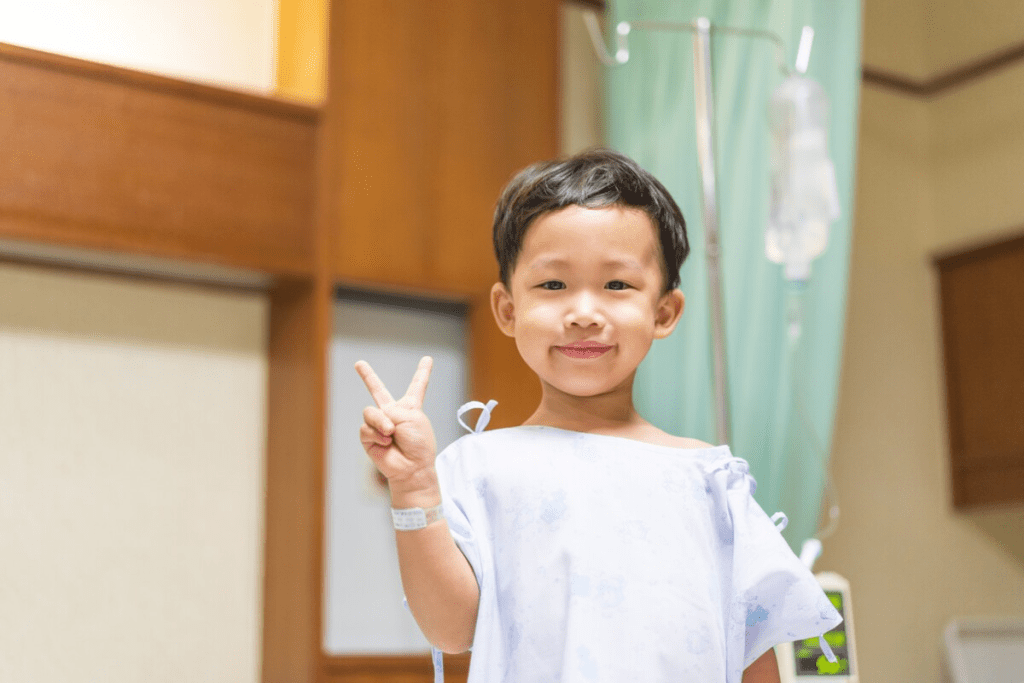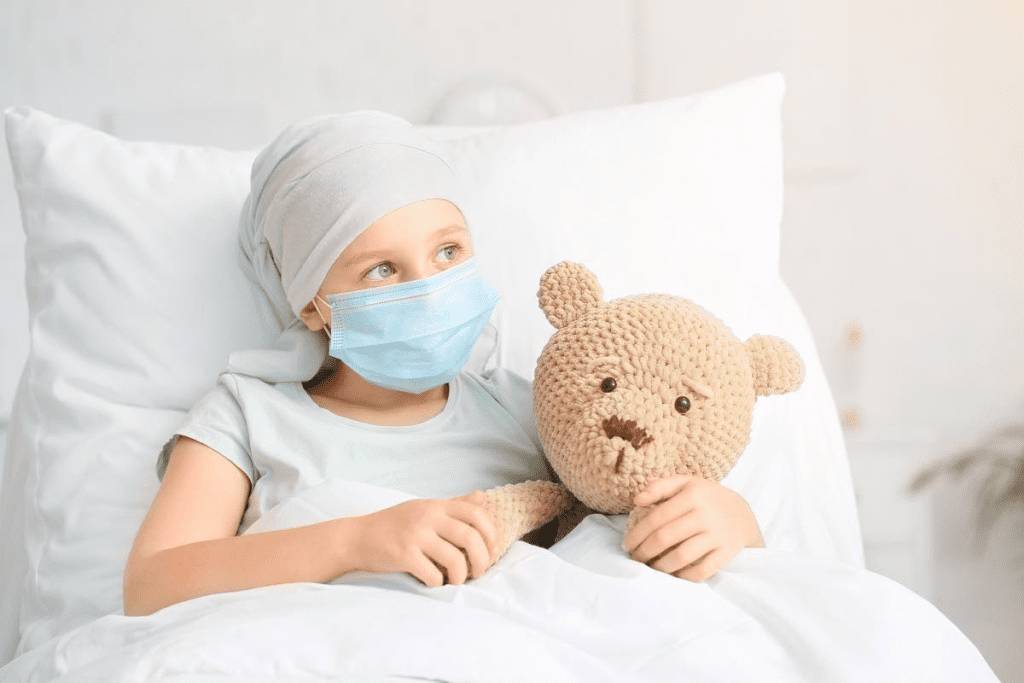Last Updated on November 13, 2025 by
When a child gets a cancer diagnosis, it changes everything for families. Every year, over 400,000 kids around the world face this challenge. It’s a tough time, filled with emotional and medical hurdles.
Supporting a child through this journey means more than just treatment. It’s about understanding and using kind words, knowing what to say to someone with cancer in a gentle and supportive way. Studies show that talking openly helps build trust and keeps the child’s emotional health strong.

Telling a child the truth about their diagnosis is key. Using words they can grasp helps them get through this hard time. Our goal is to offer top-notch care and support. We want to help families deal with this tough news.
Childhood cancer is a harsh reality that affects thousands of families every year. It’s a complex issue that needs a deep understanding. This understanding helps us support children and their families effectively.
In the United States, childhood cancer is a major cause of death among kids. About 15,000 children are diagnosed with cancer each year. Leukemia, brain tumours, and lymphomas are common types of cancer in kids.
Knowing these statistics helps us see the scale of the issue. It shows the need for more research and support.

A cancer diagnosis is devastating for children and their families. Kids may feel fear and anxiety or anger and sadness. Families face the diagnosis, treatment, and long-term effects, which can be very tough.
It’s important to offer emotional support and guidance. This helps them cope with this tough journey.
Survivors of childhood cancer often face long-term health challenges. These include organ damage, secondary cancers, and psychological issues. Ongoing care and monitoring are key to addressing these challenges.
By understanding these effects, we can better support survivors and their families. This ensures the best quality of life for them.
In the face of childhood cancer, honest talk is key. It helps care for kids and their families. It builds trust and eases fears.

Telling kids the truth about their cancer is vital. It helps them grasp their situation and why they need certain treatments. This openness lessens anxiety and fear.
Honesty is essential. It means sharing the diagnosis, treatment choices, and possible side effects. This makes kids feel more in charge of their health.
Explanations about cancer should match the child’s age and understanding. Young kids need simple, reassuring words. They should know they’re loved and cared for. Older kids can handle more detailed info about their diagnosis and treatment.
“The way we communicate with children about their cancer diagnosis can significantly impact their ability to cope with the disease.”
Honesty is key to trust between kids and their caregivers. When kids trust, they feel secure. This trust is vital during treatment, making them more open to care.
Being honest about treatment options helps reduce fear. It’s also important to acknowledge their feelings. Saying “I understand you’re feeling scared right now” can comfort them.
The aim is to create a safe space for kids to share their feelings. This way, they can face this tough time with more strength and resilience.
Talking to kids about cancer is very important. It affects their feelings a lot. We need to talk to them in a way that fits their age and how they think.
Preschoolers need simple words that make them feel safe. We should tell them cancer is a sickness we’re treating. Saying “You’re safe, and we’re here for you” helps a lot.
School kids can handle more information. We can tell them cancer is a disease and we’re using treatments to fight it. Being honest and using words they can understand is key.
It’s good to say things that show we get how they feel. Saying “It’s okay to feel upset” or “We’re here to support you” makes them feel better. It shows we care and are there for them.
Asking the right questions shows we’re interested in how they feel. Asking “How are you feeling today?” or “What’s been on your mind?” helps us understand them better. Listening to their answers and supporting them is very important.
By using these special ways to talk to kids with cancer, we can help them and their families. We can make their tough journey a little easier with kindness and understanding.
Effective communication is key for kids and families going through cancer treatment. The journey is complex, and our communication must change with each stage. This ensures kids and families get the support they need.
During active treatment, clear and simple information is vital. Kids and families need to know what to expect and how to handle side effects. We should explain things in a way that’s easy to understand, without using hard medical terms.
‘The more information we had, the less scared we were.’
This shows how important it is to be open and honest during this time.
After treatment, talking about survivorship and long-term effects is key. Families need to know what to expect and what follow-up care is needed. We can help by giving them all the information and support they need.
When treatment isn’t working, we must be kind and honest. It’s important to be sensitive to their feelings while giving them the information they need. We should avoid making promises we can’t keep and focus on supporting them through this tough time.
It’s important to avoid making false promises or setting unrealistic expectations. Phrases that downplay challenges or promise certain outcomes can be harmful. Instead, we should focus on being empathetic and validating their feelings.
For example, saying “I’m here for you” can be more comforting than making promises about the future. When writing to someone with cancer, consider messages that offer support and presence, like “You’re not alone.” Resources on what to write on a card for someone with cancer can be very helpful.
By adjusting our communication to fit the different treatment phases, we can better support kids and families. This means being mindful of the information we share, being honest but gentle, and always being there to listen and offer support.
When a child gets cancer, it changes their life. Family and friends need to step up and offer support. Siblings and friends often feel left out or unsure of how to help.
Friends of a child with cancer might not know what to say. Simple, genuine expressions of support can mean a lot. Using family support cancer quotes or messages that show empathy and understanding is a good idea.
It’s important to create a supportive space for the child with cancer and their friends. Teach friends about the condition and encourage them to be supportive. Sometimes, just being there can make a child feel understood without words.
Keeping family, friends, and the child’s school in the loop is key. This can mean setting up a communication network or just keeping everyone informed about the child’s health.
Words of encouragement are great, but practical support is just as valuable. This can include helping with chores, driving the child to treatment, or just being there to listen.
By giving both emotional and practical support, we can make a big difference. We can help create a more supportive and understanding environment for children with cancer and their families.
Compassion and understanding are key in a child’s cancer journey. It’s important to communicate well to support kids and their families. This helps them face the challenges they’re going through.
Being honest and using words that fit their age helps a lot. Showing empathy also makes a big difference. We should think carefully about what to say to someone with cancer, making sure our words are right for them.
At Liv Hospital, we aim to provide top-notch care with kindness. We support families during tough times. Our goal is to meet both their emotional and medical needs, giving them the care and understanding they deserve.
When talking to a child with cancer, be honest and clear. Use simple words for younger kids. Older kids can handle more detailed talks.
Talk to kids about cancer in a way that fits their age. Use words that show you care about their feelings. Ask questions that show you’re interested in their well-being.
When supporting someone with cancer, be kind and honest. Avoid making promises you can’t keep. Focus on emotional support and being there for them.
It’s important to support siblings and friends too. Guide friends on how to talk to the child. Offer practical help and be there for the family.
Survivors may face health issues later on. It’s key to talk about survivorship and long-term effects with families. This prepares them for the future.
During treatment, explain the process and possible side effects clearly. After treatment, talk about survivorship and long-term effects. Be compassionate and honest if treatment isn’t working.
Honest talk is key when supporting kids with cancer. Being open about their diagnosis and treatment builds trust. It also helps their emotional health.
Help friends understand how to support a child with cancer. Encourage them to be kind and ask caring questions. This makes a supportive environment for the child.
Subscribe to our e-newsletter to stay informed about the latest innovations in the world of health and exclusive offers!